Abstract
Context:
Several studies have demonstrated the activity of natural plants on the dental biofilm and caries development. But few studies on the antimicrobial activity of coffee-based solutions were found in the literature. Further there was no study available to check the antimicrobial effect of coffee solutions with different percentages of chicory in it.
Aims:
To evaluate the antimicrobial activity of different combinations of coffee-chicory solutions and their anti-adherence effect on Streptococcus mutans to glass surface.
Materials and Methods:
Test solutions were prepared. For antimicrobial activity testing, tubes containing test solution and culture medium were inoculated with a suspension of S. mutans followed by plating on Brain Heart Infusion (BHI) agar. S. mutans adherence to glass in presence of the different test solutions was also tested. The number of adhered bacteria (CFU/mL) was determined by plating method.
Statistical Analysis:
Statistical significance was measured using one way ANOVA followed by Tukey's post hoc test. P value < 0.05 was considered statistically significant.
Results:
Pure chicory had shown significantly less bacterial count compared to all other groups. Groups IV and V had shown significant reduction in bacterial counts over the period of 4 hrs. Regarding anti-adherence effect, group I-IV had shown significantly less adherence of bacteria to glass surface.
Conclusions:
Chicory exerted antibacterial effect against S. mutans while coffee reduced significantly the adherence of S. mutans to the glass surface.
Keywords: Antimicrobial, anti-adherence, coffee, chicory
INTRODUCTION
The oral cavity hosts a complex ecosystem composed of hundreds of different microbial species. Pioneer oral bacteria colonize biotic and abiotic structures; over time and following numerous specific interactions with other species, a climax community is reached. This bacterial proliferation is usually a consequence of a diet rich in sugars such as sucrose and/or of poor oral hygiene and may lead to the commonest oral pathologies, such as caries, gingivitis and periodontitis. Many strategies for reducing the accumulation of plaque have been proposed, ranging from the use of sugar substitutes to the use of vaccination against specific odontopathogenic bacteria (e.g. Streptococcus mutans) and antimicrobial agents such as antibiotics and antiplaque agents in mouth rinses and toothpastes.[1]
Dental caries yet remain a widespread public disease that highlight an urgent need to find new effective strategies.[2] Mutans streptococci are the main etiologic agent of caries, especially on smooth surfaces.[3] The adherence of bacterial cells to tooth surface is of great importance in the development of carious lesions and the interference on some of these mechanisms can prevent the formation of carious lesions.[4] In the last few years, there has been an increased interest on the properties of some plant stimulant beverages, particularly chocolate, coffee and tea, which have demonstrated anticariogenic in vitro and in vivo activity.[2]
Few studies on the antimicrobial activity of coffee-based solutions are found in the literature. Toda et al. related the effects of coffee on microbial species such as Staphylococcus aureus, Salmonella typhi, Shigella dysenteriae, Vibrio cholerae, Vibrio parahaemolyticus and Yersinia enterocolitica. They attributed this bactericide effect to the tanic acid. In vitro studies showed that extracts of coffee may inhibit glucosyltransferase in several oral streptococci.[3,4,5] Landucci et al. and Daglia et al. related the anti-adhesive effect of coffee on the adherence of Streptococcus mutans.[3] Scientists at two Italian universities conducted laboratory tests which showed that coffee molecules prevented adhesion of S. mutans on tooth enamel.[6]
At many points through history, coffee has become unavailable or too costly. During these times, people have often turned to roasted chicory as a substitute.[7] Chicory root when dried, roasted and ground, is used for preparing a tasty natural healthy beverage-chicory root tea, a cheaper and much healthier substitute for coffee.[7,8] Chicory root tea is totally caffeine-free, therefore using ground roasted chicory root instead of coffee beans is a solution for those who have personal sensitivity to caffeinated drinks.[8,9] In addition, consuming this type of coffee is linked to a number of chicory benefits, which we cannot normally receive from our usual coffee.[8] Many coffee producers often blend upto 30% of chicory with coffee, which cuts down on the caffeine content. Bru and Nescafe, the two most commonly available coffee brands in Indian market, contain 30% and 40% of chicory, respectively.
Along with this chicory offers many other health benefits such as, regulating the level of sugar in blood, aids in colon cleansing and in promoting digestion, stimulates appetite, reduces strain on liver by removing extra water and toxins, nourishes optic nerves, keeps the level of LDL cholesterol in check and as a mild diuretic. Chicory is considered to eliminate excess water accumulated in the body.[10,11,12,13,14]
Despite of so many health benefits of chicory and its association with coffee for centuries, no studies have been found till date describing its role or of various coffee formulations available commercially with different percentages of chicory for oral health.
Hence the present study was done to evaluate the antimicrobial activity of different combinations of coffee-chicory solutions and their anti-adherence effect on Streptococcus mutans to glass surface.
MATERIALS AND METHODS
Materials used in the study were
-
Test products
-
(a)100% Coffee
-
(b)100% Chicory
-
(c)80% Coffee + 20% Chicory
-
(d)70% Coffee + 30% Chicory
-
(e)60% Coffee + 40% Chicory
-
(a)
-
Microorganism
S. mutans ATCC 25175
Brain Heart Infusion Broth (HiMedia Laboratories Pvt. Ltd., Mumbai, India)
Sucrose (Qualigens fine chemicals, Mumbai, India)
Brain Heart Infusion Agar (HiMedia Laboratories Pvt. Ltd., Mumbai, India)
Glass specimens (diameter = 2 mm, length = 5 cm)
Buffered Phosphate Saline pH 7.2 (HiMedia Laboratories Pvt. Ltd., Mumbai, India)
NaCl 0.85% saline solution (Goa Formulations Limited, Goa)
Mc Farland standard (0.5) (Tulip Diagnostics (P) Ltd., Goa, India)
Anerobic glass chamber
Distilled water
Colony counter.
Procedure
Preparation of test solutions
Three coffee powders with different percentage of chicory (20%, 30% and 40%) along with pure coffee and chicory powders, procured from the local market were included in the study. The proportion of 20 g of each test product to 250 ml of distilled water was adopted as the standard solution. Test solutions were obtained by boiling the test products with the water for 2 minutes and then filtered through the paper filter.[3]
Antimicrobial activity testing
Nine milliliter of each test solution thus obtained was put into test tubes containing 0.37 g of dehydrated culture medium (brain heart infusion broth and 10% sucrose) and immediately submitted to autoclave sterilization. Growth control consisted of tubes containing BHI broth supplemented with 10% sucrose and distilled water. The six experimental groups included in the study are presented in Table 1.
Table 1.
Experimental groups included in the study
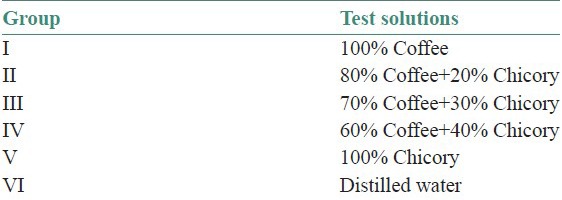
A standardized Streptococcus mutans (ATCC 25175) suspension was obtained by pipetting one milliliter of the bacterial culture into the sterile test tube containing 1 ml of broth. Then normal saline was added gradually to it so as to compare the turbidity to that of 0.5 Mac Farland Standard that corresponded to approximately 1.5 × 108 cells/ml.[5] After sterilization of the test solutions, each tube was inoculated with 1 ml of the bacterial suspension and incubated at 37°C for 1 minute, 1 hour, 2 hours and 4 hours [Figure 1]. After the incubation period, 0.1 ml of each tube's content was plated in duplicate on BHI agar. Plates were incubated for 48 hours at 37°C. After this period, the number of colonies [Figure 2] were counted and the value of logarithm of colony forming units per milliliter was calculated (log CFU/ml).[3]
Figure 1.
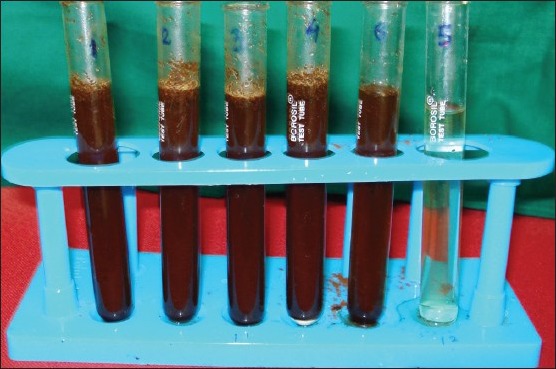
Test tubes containing test solutions and bacterial inoculums
Figure 2.
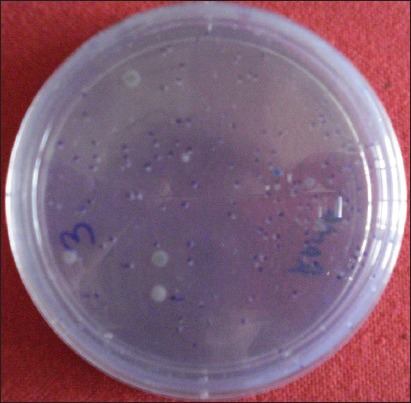
BHI agar plates showing bacterial colonies
Streptococcus mutans adherence to glass
Nine milliliter of each of the test solution was put into test tubes containing 0.37 g of dehydrated culture medium (BHI broth + 10% sucrose). Then, standardized glass specimens [Figure 3] (diameter = 2 mm, length = 5 cm) were added to these tubes and submitted to autoclave sterilization. For evaluation of bacterial adherence, 1 ml of standardized S. mutans suspension (1.5 × 108 cells/ml) was inoculated into each tube and then incubated for 90 minutes at 37°C. After the period of incubation, the glass specimens were transferred to tubes containing buffered phosphate saline (pH 7.2). Tubes were submitted to agitation and from this initial suspension; dilutions of 10-1 and 10-2 were obtained in sterilized NaCl (0.85%) saline solution. Then, aliquots of 0.1 ml of each dilution were plated in duplicate on BHI agar and incubated for 48 hours at 37°C. After this period, the number of colonies were counted and the value of log CFU/ml was calculated.[3]
Figure 3.
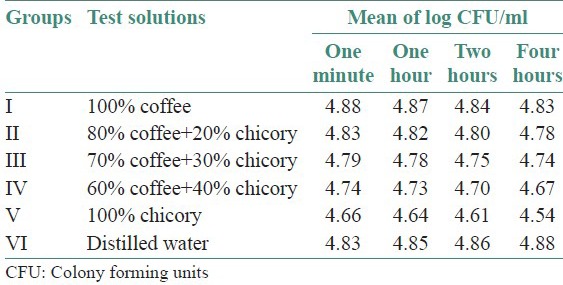
Standardized glass specimens
Statistical analysis
The data obtained was tabulated and analyzed using the Statistical Package for Social Sciences software (SPSS version 17). The mean of log CFU/ml was calculated. Statistical significance was measured by using one-way ANOVA followed by Tukey's post-hoc test. P value < 0.05 was considered statistically significant.
RESULTS
Antimicrobial activity testing
Mean of log CFU/ml obtained for the experimental groups at each period of evaluation are represented in Table 2.
Table 2.
Mean of log CFU/ml for the experimental groups after 1 min, 1 hr, 2 hrs and 4 hrs contact of Streptococcus mutans with test solutions
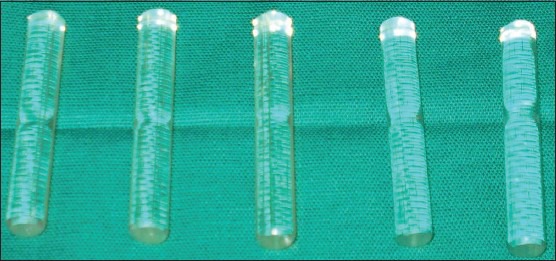
Table 2 shows, after 1 minute, all the groups (II-V) except group I had shown significantly less bacterial count in comparison to the control group (VI) i.e. water. Pure (100%) chicory had shown significantly less colony counts compared to all other groups. Group IV had shown less colony counts as compared to 1st three groups but significantly less counts were seen in comparison to groups I and II only. Group III had shown significantly less colony counts compared to group I only.
Figure 4 show, that after first and second hour, similar results were observed as observed after 1 minute. After 4 hours, all the results obtained were similar to the results mentioned above except the results of group IV. It showed significantly less colony counts as compared to 1st three groups.
Figure 4.
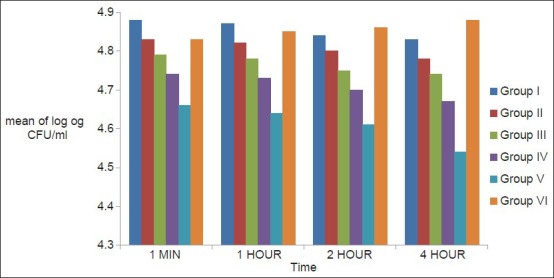
Mean of log CFU/ml for the experimental groups after 1 min, 1 hr, 2 hrs and 4 hrs contact of Streptococcus mutans with test solutions
As seen in Figure 5, though there was reduction in colony counts from 1 minute to 4 hours, among groups I-III, but the reduction was not significant. In group IV significant reduction in colony counts was seen between 1 minute and 4 hours and between 1 hour and 4 hours. In group V significant reduction in colony counts was seen between 1 minute and 4 hours, 1 hour and 4 hours and between 2 hours and 4 hours.
Figure 5.
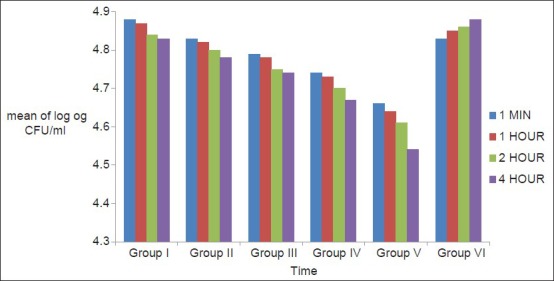
Reduction in mean of log of CFU/ml in experimental groups over theperiod of 1 minute, 1 hour, 2 hours and 4 hours
S. mutans adherence to glass
The results obtained for the analysis of S. mutans adherence to glass in the presence of the test solutions are presented in Figure 6.
Figure 6.
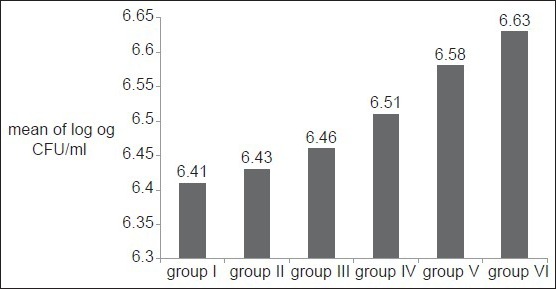
Mean (log of CFU/ml) obtained in the analysis of bacterial adherence to glass
As is seen in the Figure 6, all the groups showed lesser value for the colony counts compared to the control group (VI), but only groups I-IV had shown significantly less adherence of S. mutans to glass as compared to the control group i.e. water. Groups I and II had shown significantly less adherence of S. mutans to glass over groups IV and V. And group III and IV had shown significantly less adherence over group V.
DISCUSSION
Previous studies have been performed to evaluate the effect of several natural extracts on dental biofilm and caries development. Studies on the antimicrobial and anticariogenic properties of coffee species are not commonly found in the literature, even though it is considered the best known and one of the most appreciated drinks in the world and chicory being associated with coffee since centuries, still no studies regarding the anticariogenic property of chicory is available in literature.
Several commercial brands of coffee are available in the Indian market and for this study, three coffee powders with varying percentage of chicory in it along with pure coffee and chicory powders were selected.
In this study, 100% chicory group had shown significant reduction in colony counts of S. mutans as compared to other test groups and 100% coffee had not exhibited any significant antimicrobial activity as compared to control, over the period of 1 minute, 1 hour, 2 hours and 4 hours [Figure 4]. This results suggests that, chicory had potent antimicrobial activity against S. mutans and pure coffee solution failed to demonstrate any antimicrobial activity against S. mutans. Groups II, III and IV also demonstrated significant antimicrobial effect compared to control group, this could be attributed to the chicory content in these groups. Considering that chicory contains several substances, the isolated evaluation of each compound may clarify the specific agent related to its antibacterial effect. No previous study evaluating the antimicrobial potential of coffee with various percentages of chicory on S. mutans was found in the literature, so the results of our study cannot be compared with the other studies. In an in vitro study conducted by Brandao et al. in 2007[3] in Brazil, it was concluded that the different coffee solutions did not present any antimicrobial effect on Streptococcus mutans, but whether the brands used in the study contained any chicory or were pure coffee power was not mentioned. An in vitro study conducted by Namboodiripad et al. in 2009[5] showed that coffee has antibacterial action to Streptococcus mutans and hence has an anticariogenic action, with no mention about the chicory content of the coffee used in the study. An in vivo study conducted by Namboodiripad et al. in 2009[5] indicated that coffee has anticaries action, but the addition of the sweeteners and creaming agents, reduces the antibacterial and anticaries action of coffee. The samples used in the study group were the people who drink only coffee as the beverage; no data was reported regarding whether the pure coffee or coffee with chicory additive was used by the study group.
Also in our study, group IV and V showed significant antibacterial effect over a period of 4 hours, suggesting the antibacterial effect against S. mutans even after hours of intake of coffee containing chicory.
Regarding the adherence of S. mutans to glass surface, the results of our study demonstrated that group I (100% coffee) and groups II-IV (containing coffee and chicory powder in different percentages) showed significant reduction in adherence of the test bacteria to the glass surface. Group V (100% chicory) did not exhibit any significant reduction in adherence of bacteria. These results suggest potential anticariogenic activity of coffee, considering that adhesion of S. mutans is considered an essential step in the initiation and development of dental caries. This effect may probably be associated with the capacity to affect the synthesis of extracellular polysaccharides.[3] Also, previous in vitro studies showed that coffee may inhibit glucosyltransferase in several oral Streptococci. Landucci et al. and Daglia et al. also related the anti-adhesive effect of coffee on the adherence of Streptococcus mutans.[3] Paolino et al. observed that tannic acid inhibited glucosyltransferase enzyme of S. mutans strains and similar inhibition was observed on S. sanguis strains. Kashket et al. observed reduction of S. mutans adhesion to hydroxyapatite by tannic acid. Several in vitro experiments showed that cacao, tea and coffee inhibited glucosyltransferase of several oral Streptococci; however, some cacao extracts and coffee did not lose that character even without tannic acid and caffeine, suggesting the role of other substances in this inhibition.[3]
Considering that coffee is constituted by several substances such as water, mineral substances, glucose, lipids, organic acids, alkaloids, tannic acids, theobromine, caffeine and several vitamins. The isolated evaluation of each compound may clarify the specific agent related to its anti-adhesive effect.[3]
CONCLUSIONS
Considering the results obtained in this study, it can be concluded that both coffee and chicory powders demonstrated anticariogenic potential, but in different ways. While chicory exerted antibacterial effect against S. mutans, coffee reduced significantly the adherence of S. mutans to the glass surface.
Footnotes
Source of Support: Nil.
Conflict of Interest: None declared.
REFERENCES
- 1.Signoretto C, Bianchi F, Burlacchini G, Sivieri F, Spratt D, Canepari P. Drinking habits are associated with changes in the dental plaque microbial community. J Clin Microbiol. 2010;48:347–36. doi: 10.1128/JCM.00932-09. [DOI] [PMC free article] [PubMed] [Google Scholar]
- 2.Ferrazzano GF, Amato I, Ingenito A, Natale AD, Pollio A. Anti-cariogenic effects of polyphenols from plant stimulant beverages (cocoa, coffee, tea) Fitoterapia. 2009;80:255–22. doi: 10.1016/j.fitote.2009.04.006. [DOI] [PubMed] [Google Scholar]
- 3.Brandão EH, Oliveira LD, Landucci LF, Koga-Ito CY, Jorge AO. Antimicrobial activity of coffee-based solutions and their effects on Streptococcus mutans adherence. Braz J Oral Sci. 2007;6:1274–77. [Google Scholar]
- 4.Oliveira LD, Brandão EH, Landucci LF, Koga-Ito CY, Jorge AO. Effects of Coffea arabica on Streptococcus mutans adherence to dental enamel and dentine. Braz J Oral Sci. 2007;6:1438–41. [Google Scholar]
- 5.Namboodiripad PC, Srividya K. Can coffee prevent caries?-An in-vitro study. Internet J Dent Sci. 2009;7(2) http://ispub.com/IJDS/7/2/7150 . [Google Scholar]
- 6.Namboodiripad PC, Kori S. Can coffee prevent caries? J Conserv Dent. 2009;12:17–21. doi: 10.4103/0972-0707.53336. [DOI] [PMC free article] [PubMed] [Google Scholar]
- 7.Chicory [Internet] [Last accessed on 2010 Sept 12]. Available from: http://coffeetea.about.com/cs/coffeesubstitutes/a/chicory.htm .
- 8.Health benefits of chicory [Internet] [Last accessed on 2010 Sep 12]. Available from: http://guide2herbalremedies.com/health-benefits-of-chicory/
- 9.Chicory- A healthy coffee substitute [Internet] [Last accessed on 2010 Sept 12]. Available from: http://ezinearticles.com/?chicory-a-healthy-coffee-substitute and id=4522093 .
- 10.Benefits of chicory [Internet] [Last accessed on 2010 Sept 12]. Available from: http://herbs.ygoy.com/2009/05/20/benefits-of-chicory/
- 11.Chicory [Internet] [Last accessed on 2010 Sept 12]. Available from: http://www.herbs2000.com/herbs/herbs_chicory.htm .
- 12.Organic chicory root [Internet] [Last accessed on 2010 Sept 12]. Available from: http://www.globalhealingcentre.com/organic-chicory-root.html .
- 13.Benefits of chicory [Internet] [Last accessed on 2010 Sept 12]. Available from: http://Lifestyle.Iloveindia.Com/Lounge/Benefits-Of-Chicory-8029.Html .
- 14.Health benefits of chicory [Internet] [Last accessed on 2010 Sep 12]. Available from: http://www.naturel-homeremedies.org/blog/health-benefits-of-chicory/


